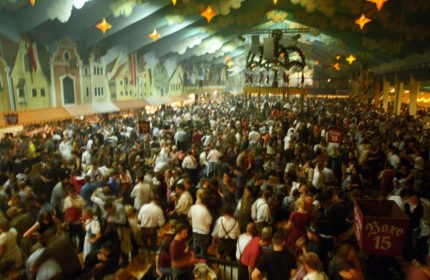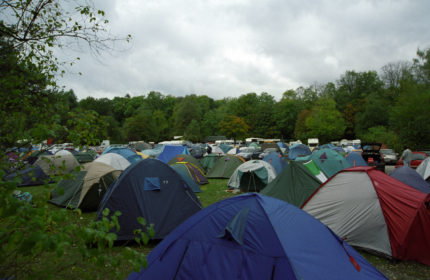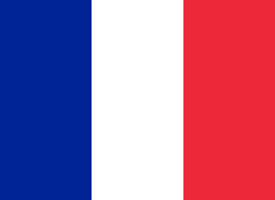
Oktoberfest, Munich
Oktoberfest started September 19th and we were anxious to make it to Munich to catch the festivities before they finished October 5th. We arrived Thursday night, in time for the last couple of days. Talk about a party! Each year, this most famous of all beerfests welcomes 6.5 million party-goers and beer drinkers from all over the world. The breweries of Munich brew a special beer, the “Wiesnbier,” for the festivities, which they transport the old-fashioned way by wagon.
The beerfest is basically one huge singing-dancing-and-drinking party. The big beerhalls (there are nine, all of which serve their own specially brewed beer for Oktoberfest) open around noon and stay open until 11:00 PM. The tables around the outside of the hall are reserved, but the large center section is a free-for-all. Even those who have reserved tables must often stand in line for hours just to get inside the halls. Once you succeed in entering, the first thing you notice is the masses of people everywhere, then the music and singing and dancing and the sound of “Prost!” (“Cheers!”) and glasses clinking. You jostle your way through the crowd to find a space at a table. Which doesn’t take long. As you walk by, you find yourself pulled up on top of a bench or a tabletop to dance. Then someone else comes by and grabs your hand to bring you to another table. As you pass through the crowd, you might get a kiss from a jovial beer drinker.
There is a band in the center of the room which provides live music and everyone sings and dances along. Half the songs are in English, which everyone seems to know. The official theme song for Oktoberfest was “My Girl,” a tune which I liked but am no longer so sure after hearing it millions of times. “I wanna knoooow – ooh! aah! – will you will be girl?” is the refrain that was sung over and over and over, which I heard all day long, from the time I woke up in the morning to the time I fell asleep at night. I am sure I will forever think of Oktoberfest whenever I hear this song in the future.
One really cool thing about Oktoberfest is that the Germans still dress in traditional costume for the fest. The men wear leather or courderoy shorts or knickers (brown or green) with a white top and suspenders. They can also wear a vest or cardigan. The women wear a calf-length skirt (either brown or with a patterned front) and a white off-the-shoulder top with a second colored top over the first one. They can wear heels if they like, but it is very much the style to wear socks and flat brown walking shoes. A lot of young women wear their hair in pigtails.
So, if 6.5 million people come to Munich to celebrate Oktoberfest, where do they all come from? Aside from the Bavarians, many Germans come from other parts of the country to party. Everyone is in agreement that the Italians represent the largest foreign contingent. Italians everywhere. I am convinced that their three favorite words are “La Bella” and “Ciao.” And then there are tons of people that make their way to Munich from England and from Australia.
Stéphane was disappointed to hear so much Italian and English, but no French. The second day we were there, he spotted a car with a French license plate at our campground and he went over excitedly to meet the two Frenchmen sitting outside their tent. The two Frenchmen turned out to be New Zealanders, Jon and Jarrad, who had been given the car and the tent to use by their boss in France. No problem. New Zealand is cool, too. So we stayed to talk and hit it off really well. We spent the rest of Oktoberfest together.
Jarrad made me laugh with his recounting of their first night at the beerhalls. He said you could get everything at Oktoberfest except beer. What, no beer?! The thing is, in order to be served, you have to either be at one of the long picnic tables or you have to at least stand by one. Which they didn’t realize right away. The server comes regularly to the tables and if you want one of the beers that they bring, you pay on the spot. But you have to be fast. They get gone quickly.
Gone quickly. No big surprise, right? However, this year, the surprise was that they ran out of beer at Oktoberfest! At the beerfest!! Normally they serve 5 million mugs of beer during the festivities. This was the first year since the Oktoberfest started in 1808 that they ran out of beer.
You might wonder just how much beer is 5 million mugs. Well, the beer is served in only one size: 1 liter jugs. One liter of beer in an enormous glass stein – that’s heavy! And that’s a lot! The Bavarians can down them almost without thinking. Along with the beer is served an absolutely astounding quantity of rotissary chickens. And beef: two entire cows are roasted on the spit every day. And then there’s the traditional carnival food. Because in addition to the beerhalls, there is an enormous carnival, with rides and rollercoasters and sausages and ice cream and candy.

camping at Oktoberfest
Oktoberfest this year was very wet. And not just from spilled beer. It rained and rained and then rained some more. We were there for the last four days of the fest and the rain hardly let up for even a few minutes. We had spent six hours cycling under the rain the day before in order to reach Munich, and I was hoping to dry out a bit. But it was not to be so. This is our 8th day in the city and the driving rain just continues without a break. But even the wet weather could not drown people’s good time. Everyone came out in force to celebrate.
A really funny sight was the people sitting under the rain drinking their beer. Those who don’t get inside the beerhalls can sit outside at one of the picnic tables on the patio. But because it was raining so much, the picnic tables were stacked one upon the other, with the beer drinkers taking shelter under the second table. Only, some of the tables weren’t quite high enough, so the people were hunched over underneath.
As we were waiting to get inside one of the tents Saturday night, I didn’t envy the job of the security guards. The one standing guard at our door had quite a sense of humor. He had the job of regulating the flow of people in and out of the beerhalls. People came up every couple of minutes to try to get in without waiting in line. They tried every trick in the book. Most just went away after the guard repeated continuously, “Nein, nein, nein” (no, no, no). However, one girl absolutely would not give in. The guard refused entry and then she started yelling at him in Italian. He, of course, responded in German. It was quite a circus. The guard pretty much had everyone laughing, even those of us who couldn’t understand a word of what was being said. Then the girl even started crying, thinking her tears would get her in. It didn’t work, and she dried up pretty quickly. At least the guard kept a good sense of humor. I think he needs it for his job.
Aside from a “beerfest,” Oktoberfest can also be called a “singfest.” Everybody sings – at the festival, walking down the street, at the campground. I was a little surprised by how many American and English songs we heard. At the campground, the Germans in the tent next to us actually started singing “Clementine” and “Oh Susanna,” those old-time American songs. I couldn’t believe it. Those were two of the first songs I learned on our organ at home when I was about 5 or 6 years old, and my mom and granddad would sing along. Then the last night of Oktoberfest, one of the last songs they played was “Amazing Grace,” which my mom always sang. Imagine that, thinking of my mom during the last moments of Oktoberfest.
The last song or two of the last night, everyone lit sparklers and lit up the hall. It was a wonderful moment. It didn’t matter what language you spoke or what country you came from, everyone had their arms around each other and swayed together to the music. It seemed to capture the essence of Oktoberfest. I think I’d like to come back someday.


